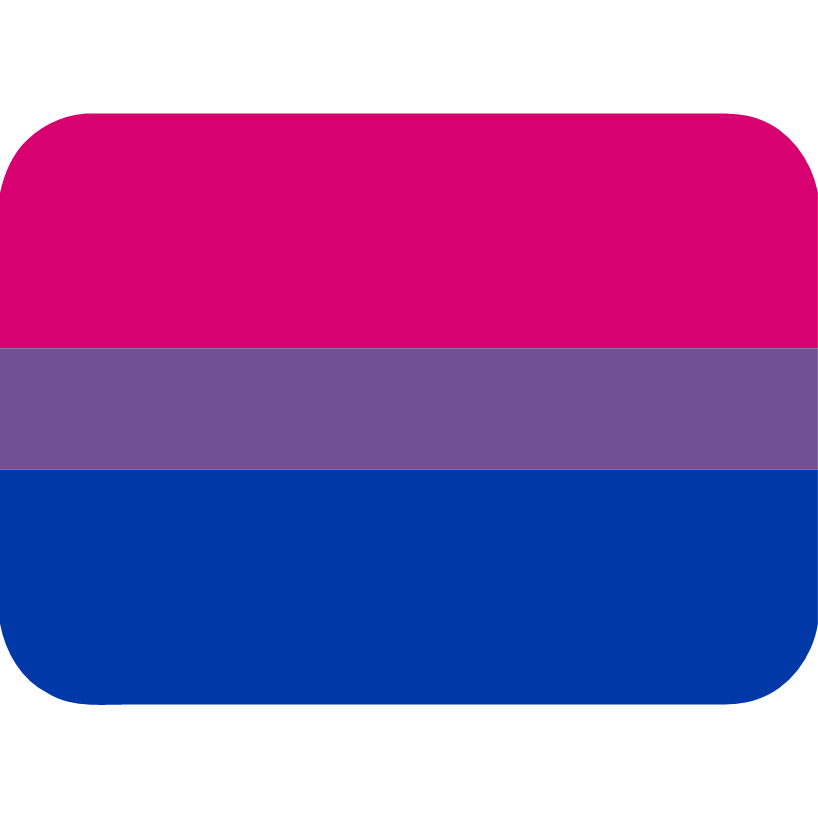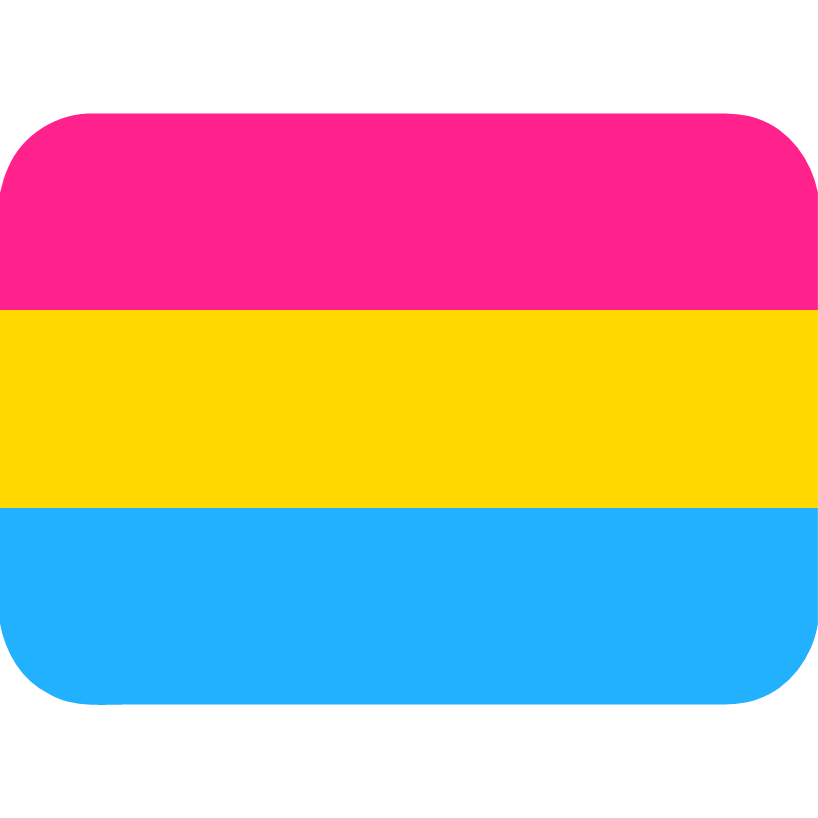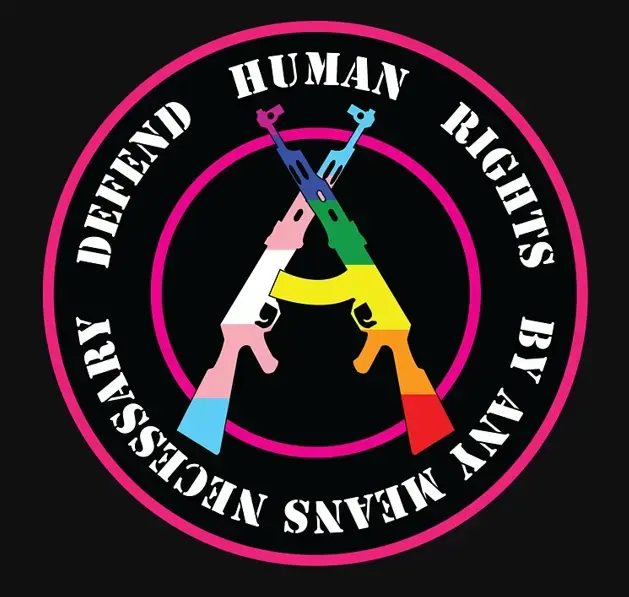Allow me to speak on these points:
- "It's never okay to call someone who uses microlabels bisexual."
- "It's never okay to call a bisexual one of the microlabels."
I identify as bisexual and pansexual simultaneously. They're not mutually exclusive because they're somewhat arbitrary neologisms with blurry semantic distinctions. No bit of language is rooted in stone, let alone more modern terms used to describe a very personalized matter like sexual orientation. I always say that how personal you are to a label is the best metric to know how adequately it describes you. Do you feel "bisexual" is a relatable term? Congrats, you're bi. Do you feel "pansexual" is a relatable term? Congrats, you're pan. And me? I use the terms in a linguistic context that makes them not mutually exclusive and core parts of my sexual identity, so I do want to correct that part (even though I know you didn't make this). Otherwise, however, I think it's a good post, and just make sure at the end of the day to emphasize respect and refrain from policing identities like a turd. Anyone who does that should touch grass ASAP.


I always use bisexual/biromantic for myself but see no issue with someone calling me pan, sometimes I even consider using that label for myself, but I also kinda feel like labeling my own sexuality/romantic orientation in any way is going to be inaccurate because I just relate to attraction in a different way than most people seem to. Like, I use "in love with" or "attracted to" as shorthands that I think others will understand, but I am pretty confident that NTs' red is not the same as my red, metaphorically speaking.
Bisexual/biromantic is a convenient way of conveying the idea of "I can see myself marrying and perhaps starting a family with a person of any gender" or "I could screw someone of any gender given the opportunity" et cetera, but the... "framework" -- I guess? -- that I prefer is one of "input and output". Something like, "Because this person is really cute I want to watch a movie with thon and hold thons hand", instead of, "What I feel towards this person is categorically love."
That I/O framework is something much more concrete, it takes a lot less guessing of what exactly other people mean by things like "love" or "attraction", it means that I don't have to worry about if it's a burn-and-sizzle crush or long-lasting love. And it's definitionally a framework where (un)falsifiable labels of who I am or am not exclusively attracted to are irrelevant, where it doesn't matter whether one categorically was "in love with" him, or if one can really rule out the possibility of ever meeting "her"...
But... I guess labels are kind of convenient, too.
This is a super common take in the bi community that I couldn't disagree with more. The MYC scheme on the pan flag makes it arguably my favorite queer flag ever.
You know, relationships between two bisexuals never last, because they always go bi-bi.
Likewise, airlines always make sure to never pair up a pansexual captain and first officer, lest the flight involve a pan-pan situation.
I feel like this is kinda busted in a taxonomic sense. My understanding an "umbrella" in categorization is that things underneath it are unified by fulfilling specific criteria, such that you can call them the same in that sense. Gorillas and chimpanzees are different species, but they're both primates and can be referred to as such. Primates and rodents are different orders, but they're both mammals and can be referred to as such. Rectangle and square, boat and ship, all that jazz. I wonder what the utility of using that kind of hierarchy is in the case that you can't group them like that, which seems to be what the graphic is saying.
I suppose the counter argument is that it doesn't need to be consistent if it feels right? I've heard the sentiment (on here, as it happens!) that labels ought to function more as beacons than walls, to attract other people who feel generally the same way rather than exclude people on a more rigid "objective" basis. Still, I feel like any attempt to categorize like this throws that out the window by necessity.
sorry to dump all this where it probably wasn't expected but this really got my brain turning on the matter and would like to hear what other people think
what we have here is an attempt to integrate two principles, namely A) sexual self identification ought to be respected and B) sexual labels have specific, universal meanings which do not depend on the feelings of particular individuals.
Now, clearly these principles are mutually exclusive, but because they're often unspoken, we tacitly try to adhere to both of them.
just going to refer to people as multi-sexual and refuse to learn any additional details.
I pretty much agree. All these categories are created by people anyway, they aren't natural laws or anything. That being said I respect what people what to be referred to as, and while I myself don't see much a difference between bi/pan/etc I'll respect those who do
Meh, I think that's an oversimplification. It's more like "they all can pretty much manifest the same in practice, but there can (not always) be minor differences between them as well", but I guess that's too drawn out.
i see at least two problems trying to label this stuff:
the minutiae is very internal and highly regionalized depending on what your first introduction to any of these terms was, the differences matter to the people identifying with the labels but not to me
shooting my shotbeing too afraid of rejection to approach them.gender is performance and signs and signifiers, and you can show straight guys who don't know a picture of finnster.
while the manifesto is more inclusive, i find these orientation labels to be rooted in a framework where the options are really just same/different/"both" and not up to the task of concisely and usefully communicating what we try to use them for in a contemporary gender theory. I'm agender and none of the orientation labels communicate what would otherwise be heteronormative attraction, but there's no "opposite" to nothing so logically i can't be straight and if i use that term anyway for convenience it erases my absence of gender.
I actually agree with the point you're making.
As a pansexual non-binary trans person, it baffles people A LOT for some reason when I tell them "I don't think transgender people, binary or non-binary, play any part into what your sexuality is.", and I think this is because people have generally have misunderstood ideas about sexual orientation and how it manifests.
The point you made about F1NN5TER is indicative of something I've always said:
"Realistically speaking, sexual orientation pertains more to perception of gender than gender itself. A straight man who sees a very feminine man [like F1NN in your case] and perceives him as a woman can find said man sexually attractive without it being contradicting. There is no magical part of your brain that tells you what someone's "true" gender is, so it's up to your interpretation at that point when you logically think about it."
Sexual orientation terms can be useful in conveying general "guidelines" as to how your sexual orientation will work, but I think people get too caught up in trying to treat it rigidly, as if labels are prescriptive rather than descriptive. There are too many straight men, especially with toxic masculinity considered, who will deny the point I made about the above self-quoted statement just because they want to adhere to a certain perception of how society perceives sexual orientation and masculinity rather than what it actually is.
I, identifying as bisexual and pansexual simultaneously, typically use the term "bisexual" to state that I have a cohesive form of multisexuality. This means that I can observe more than one gender presentation or perception of gender and find multiple ones attractive. I use the term "pansexual" to state that I am gender-blind and completely disregard gender when it comes to my preferences.
Some battle-axe bisexuals (CW: Exclusionism) will grasp at straws and say "AckcHyUALLy aLL BI pEOple arE aTtRAcTeD TO peOpLE rEGArdLESS of gENDEr", but unless they want to use semantic manipulation to inherently define multisexuality to mean "disregarding gender" (and, even then, that wouldn't even make any sense whatsoever), this isn't true. There are bisexuals who will say things like "I'm bisexual, but I like my men tall, and I like my women short." which literally, for all intents and purposes, is regarding gender. That's not to say that bisexual people who don't regard gender must identify as pansexual. In fact, I'd be the biggest one to say they absolutely should not feel pressured to do so because labels are personal, and absolutely no one, regardless of what your label is into relation to someone else's, should feel they have the right to comment on someone else's personal experience with identity, but to argue that bisexuality inherently entails disregarding gender is false and, ironically enough, biphobic in a way. There are bisexual people who proudly claim that they DO regard gender, so when they read a definition like that by so called "battle-axe bisexuals" who claim to be warriors in fighting off biphobia, it is very much possible for them to feel invalidated.
But your points are totally legitimate because, at the end of the day, the differences are marginal in practice. Even if I disregard gender and wouldn't say something like "I like my men tall, and I like my women short", my struggles on a societal level are nothing different than that of a bisexual person who would say "I like my men tall, and I like my women short", and I think that is the key reason why we should emphasize unity over exclusion in all subsects of the LGBT community, not just the bisexual portion.
Verity Ritchie, incredible bisexual, non-binary, and transfeminine (I'm all 3 of those things too 👀) YouTuber, made an incredible video touching this subject with the attention and care it deserves, all while not saying anything harsh and exclusionary.

actually the difference is that bisexuals favor a STR based build, whereas pansexuals usually focus more on DEX.
Pah! Hardly. Bisexuals are all about the acrobatics, we need high dex for that!
I call myself bisexual because I like the colour scheme the best

Is there a specific word to describe someone who is bi or pansexual, but leans towards a certain fuzzy range of gender expression? To give an example, being attracted to girls and feminine men, but not traditionally “masculine” men.
I guess that would count as omnisexual, but I’m not entirely sure.
I use bi even though I'm like 80/90% into bears, and the other chunk% is like ciswomen, fembois, and particularly scrumptious NBs
I've heard the term "finsexual" to refer to attraction to femininity irrespective of gender.
There's findom too but that's different
I'm finsexual, i'm into merpeople. Never finnsexual though, the finns know what they did.
Found this infographic in the comments of a post discussing the age-old Bi or Pan debate.
It’s a bit old now but I thought it’s good.
All good intentions, but I don't think it's so straight forward to categorise a spectrum with a wide variety of understandings so rigidly as this.
But I very much like "Let's not label each others' sexuality" and "Let's accept all multisexual labels and support each other".
I'm pan. But I'm never going to explain that term to anyone as long as there remains the more popular understanding of the term bi (especially my parents).
So I'm bi for convenience.
100% this for me too
Because of that fact I personally go against the advice in the post as it's okay to refer to me using the microlabel or the macrolabel. But honestly I'd prefer if you didn't at all because my sexuality is not your conversation piece.
This doesn't make a lot of sense to me, tbh.
I am all for recognizing that languages change all the time, etc. But also, isn't the point of laying out categorical schemes like this to provide clarity? And I think clarity calls for us to, when possible, consider etymology, history of usage, etc. because that allows people to more readily understand terminology when they just encounter it in use, rather than getting it from some kinda chart like this.
So, I think it's weird to call bi an umbrella term if the term and the terms supposedly falling under the umbrella are exclusionary. Example: "communist" is an umbrella term. You can call both Marxists and Ancoms communists, because they both fall under the umbrella. I agree that you shouldn't call a pan person bi, but that means pan doesn't fall under any kind of bi umbrella.
Also, pan and omni are synonymous; pan being Greek and omni Latin. I've never heard of this distinction of pan having no gender preference and omni having one - feels made up by this person. BTW, I identify as pan, and have a preference (though I personally wouldn't say it's a gender preference. I know several agender people and I am attracted to some, and not to others, though none of them have a gender, so I don't think gender is really what my preferences are about. And I could go on about this, but that's a whole nother post).
The obsession with categorizing things that don't neatly fit into boxes confuses me.
Like I'm all for it if it helps some people feel understood, but imma just call myself bisexual and not sweat having exactly one word to describe what makes me horny.















